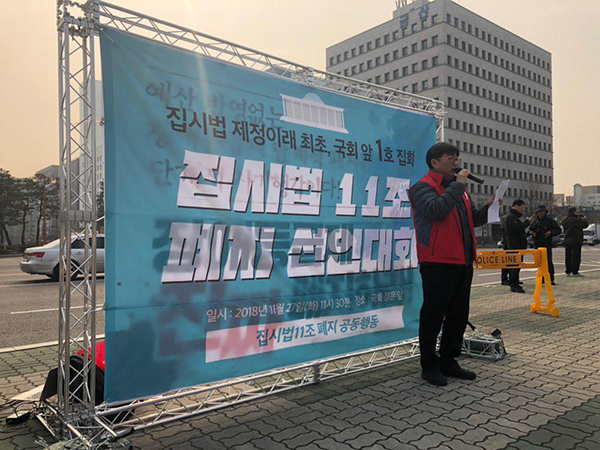
The first lawful outdoor assembly with the completion of the required report submission to the competent police authority was held in front of the main entrance gate of the National Assembly at 11:30 on the morning of November 27, since the Assembly and Demonstration Act was promulgated in 1962.
A group of about 40 workers and citizens sat together in front of a small stage for an assembly which was organized by a civic group called the 'Joint Action for the Abolition of the Assembly and Demonstration Act'. The participants were not constrained from shouting slogans and raising clenched fist.
The assembly was only made possible, because in May this year, the Constitutional Court made a decision that Article 11(places prohibited for outdoor assembly and demonstration) of the Assembly and Demonstration Act which prohibits outdoor assembly and demonstration within a 100-meter radius from the boundary of the National Assembly is not in compliance with the Constitution. A related officer of the Yeongdeungpo Police Station explained that "we accepted the report (submitted to hold an outdoor assembly), taking into account the decision of the Constitutional Court and little possibility of unlawful behaviors in the reported assembly."
In the past, labor unions and civic organizations held their assemblies in front of the KB Kookmin Bank or the Korea Development Bank which are located over 100 meters away from the National Assembly.
Only press briefings and solitary pickets, or 'assemblies in the disguise of press briefings' in front of the National Assembly were allowed. If slogans were shouted, the police blared warnings to the organizer to stop it immediately.
The former Labor Party(South Korea) leader Ku Kyo-hyun filed a petition with the Constitutional Court to review the constitutionality of Article 11 of the Assembly and Demonstration Act which prohibits any outdoor assembly near the National Assembly. He was indicted on shouting slogans that he had made when he passed by the National Assembly after a solidarity visit to the contingent workers staging high altitude protests in the areas of Gwanghwamun and Yeongdeungpo in December 2015. Ku denounced in the assembly permitted the first time in front of the National Assembly that "what the lawmakers oppose the amendment to the Assembly and Demonstration Act is only because of their sense of privilege to defend themselves and fend off the people's voice."
Besides the unconstitutionality on the ban of assembly and demonstration within a 100-meter radius from the National Assembly, the Constitutional Court also made a decision in June and July this year respectively that the ban regulated for the official residence of the Prime Minister and all levels of courts are unconstitutional. Petitions to other places prohibited for outdoor assembly and demonstration including the Blue House(Presidential residence) are still pending at the Constitutional Court. As a result of the decision made by the Constitutional Court, Article 11 of the Assembly and Demonstration Act which prohibits the ban of assembly and demonstration nearby the National Assembly, all levels of courts, and the official residence of the Prime Minister should be amended by the end of next year.
reported by Kim Hak-tae and Yon Yun-jung
translated by Kim Sung-jin

